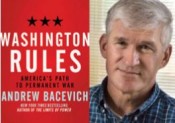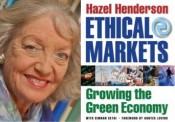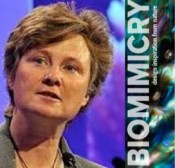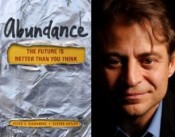Free Forum Q&A – RANDY HAYES, ED of Foundation Earth former head of Rainforest Action Network Now working to “ecologize” the economy
Written on July 2nd, 2015
Originally Aired November 2012
RANDY HAYES, described in the Wall Street Journal as “an environmental pit bull,” is a veteran of many high-visibility corporate accountability campaigns and has advocated for the rights of Indigenous peoples. These days the primary work of the founder of RAINFOREST ACTION NETWORK and current Executive Director of FOUNDATION EARTH is rethinking and “ecologizing” the economy.
According to Hayes, “The most important environmental or human rights policy is economic policy. That means changing the very basis of the failed system that created the problem. We need a deep green economy – not a green-washing economy. We must ecologize the economy…To start, we must help under-consumers (the malnourished and wanting) move up to a sustainable level of consumption while we assist over-consumers (the wasteful and indifferent) down. We must protect the remnants of wild nature and allow for damaged land, water, and sky to heal.”
http://www.fdnearth.org/staff-2/
Free Forum Q&A – ANDREW BACEVICH U.S. Army, Colonel, Ret.(after 23 years) who lost his son in Iraq WASHINGTON RULES: America’s Path to Permanent War
Written on June 26th, 2015
Originally Aired August 2010
President Obama’s recent decision to add an additional 450 American soldiers to our 3,000 strong train-and-equip mission in Iraq made me reach for a dose of ANDREW BACEVICH, a voice of sanity on issues of war and peace. Bacevich wrote of Obama’s move in an op-ed, Washington in Wonderland: Down the Iraq Rabbit Hole (Again).
In WASHINGTON RULES, the 2010 book we talk about in this interview, Bacevich (in his own words) “..aims to take stock of conventional wisdom in its most influential and enduring form, namely the package of assumptions, habits, and precepts that have defined the tradition of statecraft to which the United States has adhered since the end of World War II — the era of global dominance now drawing to a close. This postwar tradition combines two components, each one so deeply embedded in the American collective consciousness as to have all but disappeared from view.
The first component specifies norms according to which the international order ought to work and charges the United States with responsibility for enforcing those norms. Call this the American Credo — …to lead, save, liberate, and ultimately transform the world.
…With regard to means, that tradition has emphasized activism over example, hard power over soft, and coercion (often styled ‘negotiating from a position of strength”) over suasion. Above all, the exercise of global leadership as prescribed by the credo obliges the United States to maintain military capabilities staggeringly in excess of those required by self-defense.”
Free Forum Q&A – HAZEL HENDERSON, From activist mom to respected expert on global economics and sustainability
Written on June 19th, 2015
Originally Aired December 2013
In the mid-60’s a mom in NYC organized other moms as Citizens for Clean Air to fight pollution and wrote articles calling for industry and business schools to take quality of life into consideration in planning and decision-making. Though she never attended college, HAZEL HENDERSON, has gone on to a four decade career as a globally respected economist, futurist, and author. In this remarkable hour, she tells the story of her improbable and impactful life and work.
http://hazelhenderson.com/
Free Forum Q&A – JANINE BENYUS founder, Biomimicry Institute author, BIOMIMICRY: INNOVATION INSPIRED BY NATURE
Written on June 12th, 2015
Originally aired June 2011
After 3.8 billion years of R&D on this planet, failures are fossils. What surrounds us in the natural world is what has succeeded and survived. Nature has already solved many of the problems we grapple still with. Animals, plants, and microbes are the consummate engineers. They have found what works, what is appropriate, and most important, what lasts here on Earth. So why not learn as much as we can from what works? JANINE BENYUS coined a term and invented a field called biomimicry – which basically means imitating nature.
In order to make things, humans usually beat, heat or treat. We either use intense pressure, intense heat or powerful solvents to produce the chemical and physical reactions in our manufacturing processes – and it’s usually that pressure, heat or chemicals that generate pollution. What if we could produce ceramics the way an abalone does, cables the way a spider spins webs, or filter water the ways so many creatures do?
Her creative brainstorm has grown into a way of looking, working and designing that has enormous potential to save us from ourselves. According to Janine, we are now learning how to grow food like a prairie, create color like a peacock, self-medicate like a chimp, compute like a cell, and run a business like a hickory forest. And she says, “The more our world functions like the natural world, the more likely we are to endure on this home that is ours, but not ours alone.”
http://biomimicry.org/janine-benyus/
Free Forum Q&A – PETER DIAMANDIS Chairman, X PRIZE Foundation author, ABUNDANCE: The Future Is Better Than You Think
Written on June 5th, 2015
Originally aired March 2012
Opening day of the 2012 TED conference featured two talks one after the other. The first by Paul Gilding entitled The Earth is Full asked questions like, Have we used up all our resources? Have we filled up all the livable space on Earth? Gilding suggests we have – with the possibility of devastating consequences. In a talk that’s equal parts terrifying and oddly hopeful, he says, “It takes a good crisis to get us going. When we feel fear and we fear loss we are capable of quite extraordinary things.”
That talk was followed by one by this week’s guest, PETER DIAMANDIS, entitled ABUNDANCE IS OUR FUTURE, in which he makes the case for optimism – that we’ll invent, innovate and create ways to solve the challenges that loom over us. “I’m not saying we don’t have our set of problems — climate crisis, species extinction, water and energy shortages – we surely do. But ultimately, we knock them down.”
Since the dawn of humanity, a privileged few have lived in stark contrast to the majority. Conventional wisdom says this gap cannot be closed. But, according to a book by Diamandis and co-author Steven Kotler, it is closing – fast. ABUNDANCE – THE FUTURE IS BETTER THAN YOU THINK documents how progress in artificial intelligence, robotics, infinite computing, ubiquitous broadband networks, digital manufacturing, nanomaterials, synthetic biology, and many other exponentially growing technologies will enable us to make greater gains in the next two decades than we have in the previous two hundred years. They believe we will soon have the ability to meet and exceed the basic needs of every man, woman, and child on the planet.





